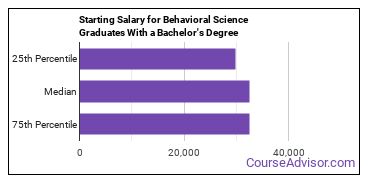Behavioral Science
Featured schools near , edit
Types of Degrees Behavioral Science Majors Are Getting
The following table lists how many behavioral science graduations there were in 2020-2021 for each degree level.
| Education Level | Number of Grads |
|---|---|
| Bachelor’s Degree | 1,814 |
| Master’s Degree | 1,148 |
| Associate Degree | 795 |
| Basic Certificate | 171 |
| Doctor’s Degree | 138 |
| Graduate Certificate | 72 |
| Undergraduate Certificate | 31 |
What Behavioral Science Majors Need to Know
In an O*NET survey, behavioral science majors were asked to rate what knowledge areas, skills, and abilities were important in their occupations. These answers were weighted on a scale of 1 to 5 with 5 being the most important.
Knowledge Areas for Behavioral Science Majors
Behavioral Science majors often go into careers in which the following knowledge areas are important:

- English Language - Knowledge of the structure and content of the English language including the meaning and spelling of words, rules of composition, and grammar.
- Mathematics - Knowledge of arithmetic, algebra, geometry, calculus, statistics, and their applications.
- Customer and Personal Service - Knowledge of principles and processes for providing customer and personal services. This includes customer needs assessment, meeting quality standards for services, and evaluation of customer satisfaction.
- Psychology - Knowledge of human behavior and performance; individual differences in ability, personality, and interests; learning and motivation; psychological research methods; and the assessment and treatment of behavioral and affective disorders.
- Education and Training - Knowledge of principles and methods for curriculum and training design, teaching and instruction for individuals and groups, and the measurement of training effects.
Skills for Behavioral Science Majors
behavioral science majors are found most commonly in careers in which the following skills are important:

- Active Listening - Giving full attention to what other people are saying, taking time to understand the points being made, asking questions as appropriate, and not interrupting at inappropriate times.
- Critical Thinking - Using logic and reasoning to identify the strengths and weaknesses of alternative solutions, conclusions or approaches to problems.
- Reading Comprehension - Understanding written sentences and paragraphs in work related documents.
- Writing - Communicating effectively in writing as appropriate for the needs of the audience.
- Complex Problem Solving - Identifying complex problems and reviewing related information to develop and evaluate options and implement solutions.
Abilities for Behavioral Science Majors
As you progress with your behavioral science degree, there are several abilities you should pick up that will help you in whatever related career you choose. These abilities include:

- Inductive Reasoning - The ability to combine pieces of information to form general rules or conclusions (includes finding a relationship among seemingly unrelated events).
- Written Comprehension - The ability to read and understand information and ideas presented in writing.
- Deductive Reasoning - The ability to apply general rules to specific problems to produce answers that make sense.
- Problem Sensitivity - The ability to tell when something is wrong or is likely to go wrong. It does not involve solving the problem, only recognizing there is a problem.
- Oral Expression - The ability to communicate information and ideas in speaking so others will understand.
What Can You Do With a Behavioral Science Major?
People with a behavioral science degree often go into the following careers:
| Job Title | Job Growth Rate | Median Salary |
|---|---|---|
| Community and Social Service Specialists | 13.2% | $42,620 |
| Life Scientists | 9.0% | $78,190 |
| Neuropsychologists and Clinical Neuropsychologists | 10.3% | $100,770 |
| Transportation Planners | 6.7% | $81,340 |
Who Is Getting a Bachelor’s Degree in Behavioral Science?
Racial-Ethnic Diversity
At the countrywide level, the racial-ethnic distribution of behavioral science majors is as follows:

| Race/Ethnicity | Number of Grads |
|---|---|
| Asian | 96 |
| Black or African American | 270 |
| Hispanic or Latino | 280 |
| White | 874 |
| International Students | 23 |
| Other Races/Ethnicities | 271 |
Geographic Diversity
Behavioral Science appeals to people across the globe. About 1.3% of those with this major are international students. The most popular countries for students from outside the country are:
- Canada
- India
- Malaysia
- China
- South Korea
How Much Do Behavioral Science Majors Make?
Bachelor’s Degree Starting Salary
According to 2019-2020 data from the U.S. Department of Education, students who graduated with a bachelor’s degree in behavioral science have a median salary of $32,579 during the early years of their career. During this timeframe, most salaries fell between $29,935 (25th percentile) and $32,579 (75th percentile).

Note that some of these people may have jobs that are not directly related to a behavioral science degree.
Salaries According to BLS
Average salaries range from $46,050 to $89,150 (25th to 75th percentile) for careers related to behavioral science. This range includes all degree levels, so the salary for a person with just a bachelor’s degree may be a little less and the one for a person with an advanced degree may be a little more.
To put that into context, according to BLS data from the first quarter of 2020, the typical high school graduate makes between $30,000 and $57,900 a year (25th through 75th percentile). The average person with a bachelor’s degree (any field) makes between $45,600 and $99,000. Advanced degree holders make the most with salaries between $55,600 and $125,400.
Amount of Education Required for Careers Related to Behavioral Science
Some degrees associated with behavioral science may require an advanced degree, while others may not even require a bachelor’s in the field. Whatever the case may be, pursuing more education usually means that more career options will be available to you.
Find out what the typical degree level is for behavioral science careers below.

| Education Level | Percentage of Workers |
|---|---|
| Bachelor’s Degree | 36.2% |
| Master’s Degree | 12.1% |
| Doctoral Degree | 4.0% |
| Post-Doctoral Training | 48.2% |
Online Behavioral Science Programs
In 2020-2021, 128 schools offered a behavioral science program of some type. The following table lists the number of programs by degree level, along with how many schools offered online courses in the field.
| Degree Level | Colleges Offering Programs | Colleges Offering Online Classes |
|---|---|---|
| Certificate (Less Than 1 Year) | 0 | 0 |
| Certificate (1-2 years) | 2 | 0 |
| Certificate (2-4 Years) | 0 | 0 |
| Associate’s Degree | 29 | 8 |
| Bachelor’s Degree | 13 | 3 |
| Post-Baccalaureate | 0 | 0 |
| Master’s Degree | 28 | 3 |
| Post-Master’s | 4 | 0 |
| Doctor’s Degree (Research) | 19 | 0 |
| Doctor’s Degree (Professional Practice) | 1 | 0 |
| Doctor’s Degree (Other) | 0 | 0 |
Is a Degree in Behavioral Science Worth It?
The median salary for a behavioral science grad is $85,750 per year. This is based on the weighted average of the most common careers associated with the major.
This is 115% more than the average salary for an individual holding a high school degree. This adds up to a gain of about $917,000 after 20 years!

Top Ranking Lists for Behavioral Science
Explore Major by State
Alabama
California
District of Columbia
Idaho
Kansas
Maryland
Mississippi
Nevada
New York
Oklahoma
South Carolina
Utah
West Virginia
Alaska
Colorado
Florida
Illinois
Kentucky
Massachusetts
Missouri
New Hampshire
North Carolina
Oregon
South Dakota
Vermont
Wisconsin
Majors Related to Behavioral Science
You may also be interested in one of the following majors related to behavioral science.
References
*The racial-ethnic minorities count is calculated by taking the total number of students and subtracting white students, international students, and students whose race/ethnicity was unknown. This number is then divided by the total number of students at the school to obtain the racial-ethnic minorities percentage.
- College Factual
- College Scorecard
- National Center for Education Statistics
- O*NET Online
- U.S. Bureau of Labor Statistics
- Usual Weekly Earnings of Wage and Salary Workers First Quarter 2020
- Image Credit: By Polimerek under License
More about our data sources and methodologies.
Featured Schools
 Request Info
Request Info
|
Southern New Hampshire University You have goals. Southern New Hampshire University can help you get there. Whether you need a bachelor's degree to get into a career or want a master's degree to move up in your current career, SNHU has an online program for you. Find your degree from over 200 online programs. Learn More > |

